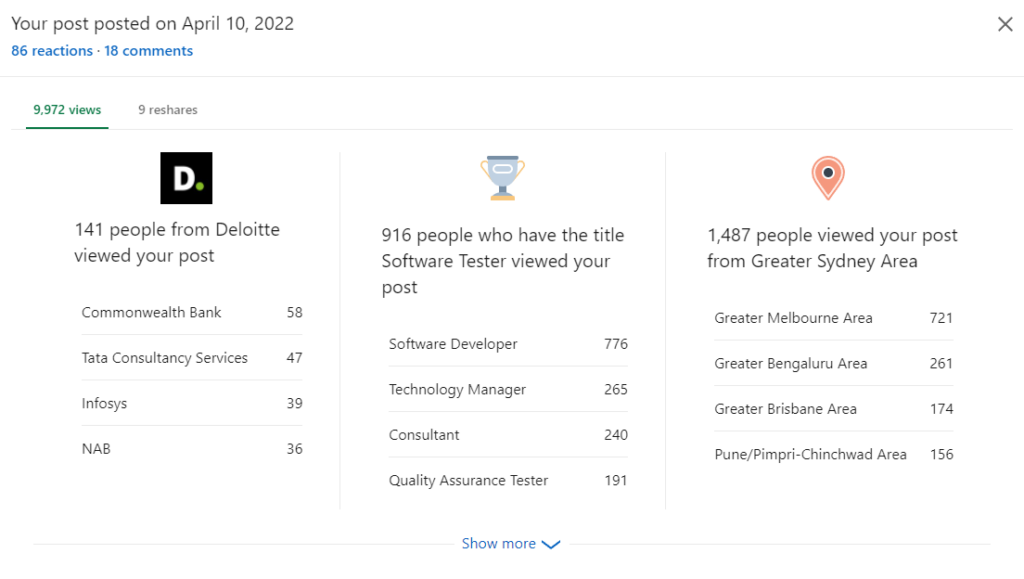Estimated reading time: 11 minutes
Wow, I haven’t written a blog post for a while. I finished up a 3 month contract in February and was experiencing a sense of burn out. It’s taken me 2 months to recover some sense of sanity.
I’d like to take a longer break but I recently got a tax bill for my companies first year of operation. That was meant to be my June pay so it’s now motivation to get back into the job hunt.
This blog post will go through my process and tools that I used to keep track of all of the leads while job hunting. It can be a full time endeavour and it’s useful to take the time to find the most strategic role.
Table of Contents
Timeline
25th of February: contract ended
Posted that my contract was ending and casually looking for work.

Had a few conversations about roles come from this post, a promising lead of a flexible contract potentially starting in April was discussed. I wasn’t looking to jump straight into work as I was over whelmed with burnout and wanted to take some time for myself.
30th of March: asked around
Asked a few recruiters about potential leads.

I had forgotten about the part time contract I was meant to be starting in April. That falling through also got me thinking about getting back on the job hunt.
5th of April: networking
Gave a workshop at AusNog conference on presentation skills for technical people. There was a networking event afterwards. I managed to get a few business cards for some potential sales engineer roles.

I had been considering a career change out of testing and trying some tech sales instead. However I didn’t follow up with any of these leads as switching roles for 3 years before I start an advice business didn’t seem ideal.
10th of April: posted looking for work
post on LinkedIn; announcing I was open to work.
When posting, “I’m looking for work” on LinkedIn, try not to sound desperate. I’ve seen a few I’m depressed/need to support my family posts and I know it can be very stressful to be out of work when you haven’t planned it. But companies are more likely to take advantage of you in this situation.
Try to cover:
- What are you looking for
- What you have enjoyed in previous roles
- What common tools/skills you have experience in
- What industry you would prefer
- Availability
- What aren’t you looking for
- Remote work preferences
For example I could say I’m not looking for web automation or for writing automation frameworks from scratch.


20th of April: shout out to community
Shout out for support and thanks to the community.

27th of April: webinar; is testing a good career?
Webinar: Is testing a good career choice?

2nd of May; accepted an offer
I’ve verbally accepted an offer with a company. It was my second preference but it’s been a little slow getting feedback from other roles. So the fastest company gets the worm.
Preferred role
I was looking for a role that would focus on collaboration with engineers and testers on owning and improving their own quality engineering process.
I enjoy working closely with software engineers towards a common goal. And enjoy coaching and mentoring other people in how to be better testers. Testing is a skill any one can practice and develop.
Also wanted something technical that helps me keep my skills up to date. I want to get my hands dirty on code. I enjoy building things that people find useful. I’m an engineer at heart.
Comparing perm and contraction

If I get a contract on $1000 per day, this is the equivalent of receiving a 180K salary plus super. A perm role that offers around 160K plus super is competitive compared to contracting. Especially if there are things like equity, training budgets, perks, less stress or bonuses involved. I was going to stick to contract gigs, but got more leads for perm roles this time round.
For contracting I assume 42 billable weeks in the year because I need 4 weeks for annual leave, 2 weeks for sick leave, 2 weeks for public holidays and 2 weeks for professional development. I also have around 12K of business expenses between the accountant and other costs.

It’s not hard to find test automation focused contract roles around that $900 per day. So looking out for $1000 per day test lead contracts is doable. These roles can be hard to find with lots of competition but not impossible. It’s a good idea to have a 3 to 6 month emergency fund for being in between contracts if you go down this route.

Lifestyle and savings
I need 60K per year to fund my lifestyle, extra funds get added to superannuation and will count towards the first home super savers scheme and I’m building a 12 month emergency fund buffer for when I start my own advice business. It will take me 3 years to achieve this goal.
Medium term career goals
Finish studying financial advice this year, in 3 to 4 years start a career change. Would need to intern as a financial adviser for 1 year before I can practice under my own licence. Build a mobile app that helps people with financial literacy that feeds into the advice business.
Short term
Prefer a role that fits strategically with my medium term goals. Something in the finance space that helps me pick up more industry experience that can be used in the financial advise sector.
Keeping track of leads

I ended up using this spreadsheet to manage all of the leads. Had conversations for at least 17 different roles. I sorted by interest and gut feel/strategic alignment with my goals. I’ve used a spreadsheet for previous job hunting efforts too.
I’ve redacted all client information for the recruiters who were working on behalf of clients. You are more than welcome to reach out to these recruiters specifically if you’d like to learn more about these roles.
It’s always nice to keep track of when interviews are and when I last contacted the recruiter to keep on top of stale leads.

The calendar did look a little busy at times. Job hunting can be a full time effort.

Dealing with recruiters
It can be challenging to deal with all of the phone calls/conversations from recruiters or hiring managers. Here are some tips to make it easier to deal with the information overload:
- Be transparent with where you are at with other roles
- Seriously, I’ve had every recruiter thank me for this
- Have a template response
- Call back if someone leaves a message
- Take a note of when a recruiter last contacted you
- Follow up with a recruiter if it’s an exciting role but there’s been slow feedback
- Don’t be afraid to say no, it’s not right for me
- Offer to help them (recruiting isn’t an easy job)
- Make it easy to contact you
- Maintain a sense of professionalism
- It doesn’t help any to get angry or upset at people involved with the job hunting process
Offering to help recruiters
I always make sure to offer to help recruiters if a role is not quiet for me. Maybe I can use my network to also benefit them? I also have a template message with a clear call to action to make it easier to interact with recruiters.

Hi {insert_name},
I'm interested in hearing more. for perm positions I'm looking for 160K plus super.
You can access my CV here:
You can book me in for a chat here:
https://calendly.com/bughuntersam/chat
Also, I'm happy to give you a shout out on LinkedIn if it would help you with your recruitment process.
Regards,
Sam
Connecting with recruiters
Here’s the list of most of the recruiters/hiring managers who I spoke to as a part of this process. Feel free to connect with them on LinkedIn if you’d like to keep up to date on the Australian tech job market:
Career coach
I reached out to Eli Gündüz while I was job hunting to help get a second opinion. Eli helped me to figure out what role was a good strategic fit and also gave me pointers on how to chase up 2 recruiters because I hadn’t received feedback for some time.
I had an early verbal offer from one company but wanted to wait for 1 or 2 more roles because of the strategic fit. It was great to talk to a third party who didn’t have a vested interest in the outcome.
You can check out the careersy career coaching website here.
Know how much you are worth
It’s always worth keeping an eye on the salary expectations for your role. I like to browse salary guides that are released by different bodies. For example there’s this Hays salary guide. Technology is from page 153 to 162 and the average test lead in Sydney is on 112K, so having a reputation and networking has helped me immensely in getting a better salary.

Conclusion
Having the luxury of time when job hunting is great for finding a strategic role that fits with where you want to take your career.
I had a 3 month emergency buffer of cash to help me through this. And an investment portfolio that could fund another 3 months if things got really desperate.
Also there is nothing wrong with working your network to it’s full potential. Networking has been crucial for my career success.
I hope this blog has helped you with insights into how I’ve approached this round of job hunting.


1 comment